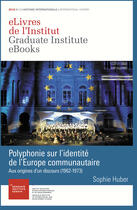Résumé:
This book seeks to contribute to an understanding of the role played by international trade law in shaping economic outcomes from a theoretical perspective. The focus is on geographical indications (GI), an intellectual property right defined in the TRIPs Agreement of the WTO. The premise is... Voir plus
This book seeks to contribute to an understanding of the role played by international trade law in shaping economic outcomes from a theoretical perspective. The focus is on geographical indications (GI), an intellectual property right defined in the TRIPs Agreement of the WTO. The premise is that a GI can be conceptualized as a `club asset´: firms that produce GI-labelled goods both add value and derive benefits from the GI. The book starts by presenting a dynamic model of GI reputation under the assumption that quality is endogenous. This is followed by a static partial equilibrium model of club optimality conditions under the assumption that quality is exogenous (defined by a standard). The author concludes by presenting a model of the welfare effects of the so called "claw-back" of GIs, when a country starts protecting a foreign GI previously considered generic.
Donner votre avis









